


I recently had a chance to talk to Nicholas Vining, the Technical Director of Gaslamp Games' Clockwork Empires. In our interview, we touched upon the topics of the game's design philosophies, the surge in popularity of titles like Dwarf Fortress, the obsolescence of demos, and the rise of YouTube and Steam Early Access titles (which are both two separate issues). Read on!
Gameranx: First, let’s talk about Clockwork Empires and what your plans are for the near future, for anyone who’s already playing the game.
Vining: I think we're just going to start giving patches names like Penny Dreadful novels from English literature, so this is "Conscript Steelcog versus the Murdercults", so we added murdercults, it's sort of a big giveaway.
We put in a bunch of more military controls, we added a new jungle biome, complete with giant beetles, coconuts, jungle fowl, various other strange fungus things to explore.
Cults will now actually axe murder you properly, they'll build creepy shrines, they'll turn into monsters. There's a huge, huge bulk of general bug fixes and UI improvements and stability and polish and this, that and the other. Yeah the main points are sort of cults and axe murdering.
Gameranx: Cults.
Vining: Cults and axe murdering.
Gameranx: Cults and axe murdering, sounds awesome.
So for those not in the know, why don't you tell us a little bit about Clockwork Empires. At first glance the game looks a lot like an old fashioned city simulation. What's different, aside from cults and axe murderers?
Vining: Cults and axe murders are definitely not something you see in The Sims. I don’t know there was something in Sims 4, we looked at it, that seems like one of our ideas.
Clockwork Empires is a little more fine-grained than a city builder. The term that we have seen used is think is colony builder. We think it's an example of an emerging genre that doesn't really have a name. The focus is much more on individual characters.
Basically the idea is that we're different in a couple of key ways. The key one is that the individual colonists are very fine-grained simulated, they each have their own personality traits, they each have their own memories and emotions, you don't manage them directly, you don't smack them around with the Dungeon Keeper hand, or say "you, mind the node" or whatever. You put the jobs out, and then they self organize into work parties and do them, as their emotional states see fit. So it's much more of a character driven simulation, than something where the focus is really on architecture.
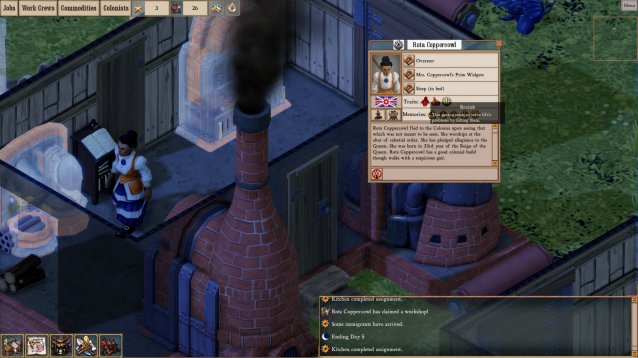
Gameranx: What would you say the pillars of the game design of clockwork empires are? Give us an overhead view of the game
Vining: The pillars. OK, it sounds very Peter Molyneux.
I'd say the basic idea is that you're a bureaucrat colonial grade sent off by the Clockwork Empires which is this pseudo-victorian steampunk version of alternative Britain. You're sent off to colonize foreign lands to the glory of the Empire, cover the land of progress, cut down every tree, mine every node, pollute every river. You're given a handful of colonists, you're given a selection of fairly dodgy steampunk equipment, everything else, live off the land, cut off the trees, build it yourself. That's sort of pillar 1.
Pillar 2 is the simulation.
Pillar 3 is that, while you are building and covering the land in progress and so long and so forth, every... there is a strong Lovecraftian bent or cosmic horror bent. Basically the universe of Clockwork Empires is also full of that which man was not meant to know. We have fish people who will come off of the sea and attack you...
Gameranx: The Deep Ones.
Vining: Yeah, well we don't actually use any of Lovecraft stuff for two reasons. One, it's not clear what is actually in the public domain and what is not, and two, Lovecraft was actually an enormous racist.
Just astonishingly racist. We steer well away from anything that actually impinges on his intellectual property for a number of reasons, which is certainly one of them.
But yes, things from beyond, things from other dimensions, things that inhabit invisible geometries or left by ancient civilizations, whose motivations are unknowable and unfathomable. These are the sorts of things that you'll tangle with, as well as other nations, and your every day run of the mill occultists who worship all of this stuff.
So if you've played Arkham Horror or any of those other games that have inhabited a Lovecraftian universe, you know that it's very, cosmic horror is very stimulating, and turns out when you mix it with steampunk you get what's basically a peanut butter and jelly sandwich. Peanut butter is good, jelly is good, you put em together and you have a classic.
That's sort of the basic idea, build a colony, it will fail horribly every time. But failure is fun, and the idea—it’s a sandbox—it’s fun watching everything get smashed up and blown to pieces, and then because you work for the government, if it's a big enough failure, you'll get a promotion and some metals and you go on to the next one.
That's basically it on a nutshell. It's very character driven, there's a large focus on the simulation of the individual characters, they have their moods, needs, wants, friends, dreams, hopes, things that interest them, some of them will go off and join unsuitable organizations in this patch, they will form cults, and they will plot murder of other people of the town, to appease their strange ends, will build secret shrines, and will hang out and have dodgy conversations.
Eventually, if you let it get that unchecked enough, bad things will happen. There will be more sophisticated cult management tools in future patches, but right now your best bet is to subject them all to a healthy dose of frontier justice, or what we like to call shooting somebody. Everybody has a big frontier justice button on their character sheet that at any time you may treat them as you see fit.
It's very much a sandbox game, very much a simulation. Those are the key pillars: steampunk, simulation and cosmic horror.
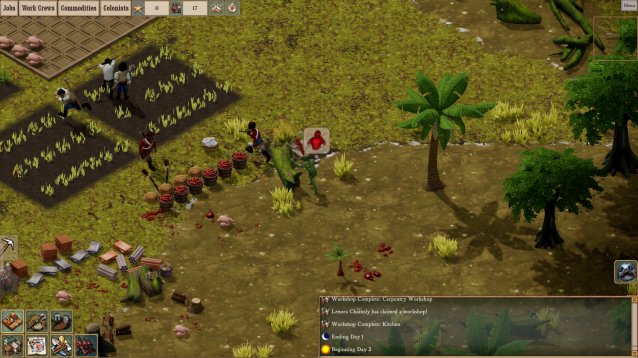
Gameranx: What degree of the agency do the characters have in the game?
Vining: Define agency.
Gameranx: What can they do on their own, you mentioned earlier that they will go off and do their own jobs and stuff if they're motivated to do it, but what kind of stuff can they do?
Vining: In terms of stuff that they just do on their own, they have needs, you have to keep em fed and sheltered and so on and so forth, they’ll eat, they’ll sleep, they’ll drink if they're upset, which has the plus benefit of eliminated bad memories, so if they’re depressed by their memories, drinking will literally help them forget, they'll gossip with each other, they’ll make friends, they’ll get married, they'll rant and rave.
For the next patch, every time we do another patch we add more and more character behaviors. One of the nice benefits of Early Access for us is that we can build it like a layer cake. Right now, they'll throw parties, they'll enjoy tables and chairs, they'll enjoy looking at paintings, some of them, if you have upper class citizens, they'll do things like write poetry or try to write poetry, or harangue the lower class, if they get upset they'll throw tantrums and cry, they go off and commit axe murder, if they're hungry and they run out of food they'll resort to cannibalism.
If they're particularly touched by that fishy look they will walk to the sea never to return, well maybe they'll return but they'll look very different.
There's lots of agency. One of the nice things of how we set the simulation up from a technical perspective is its very easy to add behaviors, if someone here thinks of something has a good idea or a silly idea we just dump it in and see if it works. The scope for expansion is basically endless. Still very early days yet.
Gameranx: So, you know in recent years we've seen a surge of popularity in games like Dwarf Fortress, Tropico, SimCity. What games would you say influenced Clockwork Empires?
Vining: I would say Dwarf Fortress was the big influence, for sure. It's sort of, very, definitely something that we all like, something that I played a great deal of, a lot of the drive, in the design of Clockwork Empires is to try to get some of the really good bits in Dwarf Fortress, the fact that it generates these complicated procedural narratives, where you watch stuff and it happens and it has a cause and effect that suddenly people write about and put it on lets plays and so on and so forth. That's really exciting, that's what where we ultimately envision ourselves, and we're getting close, cause people are writing short fiction about what happens in their colonies down in our forums, that's the first sort of token step towards that.
Dwarf Fortress has been hugely influential in terms of defining that as a concrete goal.
I think a lot of the Bullfrog influence, Theme Hospital is definitely one. A certain amount of influences from outside games, obviously.
We did an interview yesterday where one of the things that the interviewer brought up which I hadn't thought of, is that we're very rooted in the traditions of Victorian escapist literature, Alan Quartermain, the King Solomon’s Mines so on and so forth.
That's sort of a big cultural touchstone and again Lovecraft and other cosmic horror. Cosmic horror as a literal tradition goes all the way back to Edgar Allan Poe, Masque of the Red Death, thats a big influence as well, Robert Chalmers’ The King in Yellow, some of the other people working in that field.
In terms of gameplay, Dwarf Fortress is a big one, and also, not even in terms of a game thats an influence, but in terms of other things being an influence, one of the most interesting and exciting that has happened this year, I think, is really seeing YouTubers taking games, Minecraft most notably but there have been others, and really using them as creative platforms so if you look at some of the stuff that larger YouTube channels are doing with Minecraft or Space Engineers or any of those other build-y sort of simulationl-y titles, thats been something thats been very inspirational in terms of, ok, this is a thing people are really enjoying doing, lets put as many as elements as we can into the game to sort of to push for to being a platform where people will really want to do more of that, where you'll want to have a colony and share it with your friends, and put it on youtube videos and write about it.
Vining: that cultural shift has been very influential I think. That's an emerging trend in the game industry right now. So maybe we're just part of that I'm not sure.
Gameranx: What made you guys decide to want to make a simulation, I mean, your previous game was Dungeons of Dredmor and that was a roguelike.
Vining: That’s a really good question. We kicked around a bunch of ideas. I think as a company, the three directors, we make the games that we like playing. That can be problematic, because I don't really play many new games. My idea of gaming stopped somewhere in 1996. David, our art director is a simulation nut, and his idea of a perfect game is optimizing the relative position of grain silos somewhere in the Ukraine, for optimal tractor management. That's the sort of stuff he keels over. Really enjoys it.
Daniel our CEO is very into the ideas of emergent narratives.
We'd sort of had some steampunk concepts from a game we wanted to do before Dredmor, but we cancelled it before it was terrible, some of that is there as well, it's just a big melting pot of things. The dust had settled, I think I was also playing a fair amount of Dwarf Fortress at the time, we sort of looked at all the goals and they sort of seemed, OK this seems like, a project that we think would be really interesting to work on, that we would like to play and hopefully other people would as well.
Apologies this is soft of nebulous non-answers, there wasn’t really a moment where we weren’t “A-ha! That’s it!” Nobody had a fever dream, and woke up with a cold sweat and dashed for the laptop.
It's really just a big melting pot back of what we were thinking about in 2011 back when we started this.
Gameranx: That's three years ago.
Vining: Yeah it's been going on for quite a while now. Our first hires for Clockwork, we picked up the art team in march of 2012. We've been working on it pretty solidly since then. Dredmor came out in July 2011, I sort of ended up doing patching and support for about a year after that, but we'd certainly ramped by february or so.
The problem with simulations is that a lot of code was done which isn’t necessarily player facing. We wrote our own engine, so there's the backend for that, there's the work on the building creation code, cause you could sketch out blueprints and we create buildings procedurally from that, that was a big deal, theres the landscape code, there's multiplayer network which isn't even turned on yet but we started that, there's memory management, there's scripting, there's audio layer of dynamic music and stuff, there's a lot of work just to get where we are now, where it's playable, and really I would say in the last—oh I dont know—it really really really started coming together earlier this year.
That's just how games are, you add a lot of disconnected stuff, and then, you look at at it, and you go, oh, well, this is sort of a game now. But its definitely been an ongoing process.
I’m really very happy that people can go out and buy it in Steam Early Access, which has definitely been a unique experience.
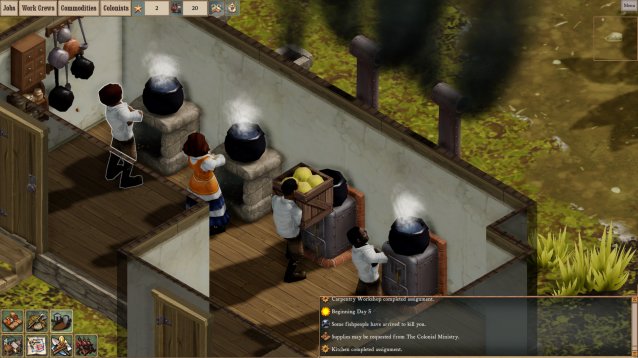
Gameranx: What do you think of the role of journalists and critics play in the game industry? What, say, is the influence (if any) that they’ve had on the development of Clockwork Empires?
Vining: I don't know, really we make the sort of games that we like to play, Dredmor came out when I was going through a big roguelike kick, many years ago, and sort of really tried to explain it to other people, why it was fun, and then started saying, ok well I'll show you why it's fun. Clockwork Empires owes a lot to other simulations—Dwarf Fortress is a good one.
First and foremost, if we're not enjoying the games ourselves that we make, nobody else is going to. Really we are always our own worst critics, compared to the fussing over things that we do ourselves, I’m not dreadfully convinced that anybody can be a worse critic than actually be a worse critic than we are.
If that makes sense.
Gameranx: That answers it perfectly.
At the end of the day we like playing games, we like making games, we just try to make the best games we can. I think some people are really going to like our stuff, I think that some people may not like our stuff and thats ok.
That’s just the way the dice rolls sometimes, if you have a large market of titles then, you know, something for everybody.
Gameranx: Exactly.
Vining: That’s the really great thing about how the PC platform has taken off in recent years—is that there’s just so much good stuff out there that I cant even hope to play it all
I've got a backlist as long as my arm
Gameranx: So do I, my list is equally big.
Vining: It’s still really exciting. It's just, I don’t know—early access has been a really good experience for us in terms of that. It's been very rewarding in terms of a) actually having this out in early form, and just sort of having, forcing yourself to get to that hurdle and then over it and then having it out there and having the community go and play it and be, OK, well you’ve done this, we like these things, we don’t understand these things, and these things crash constantly.
but having that validation, that you're doing things, that some people like, even if its the hardest of your hardcore fans, early on in the process, is super exciting and incredibly rewarding.
I'm really glad that it's working out for us as well as it is.
September's patch is great. Every time that, we started with earliest access, which is pre-Steam, and then early access, our first Steam build was way better than our earliest access one, and I think this one is better, and I hope we just keep moving in that direction. That's the way you do it.
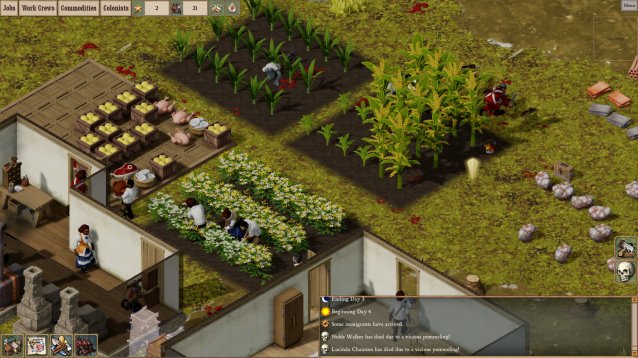
Gameranx: The game is currently available on Steam, it's on Early Access, can you tell us when will the game will come out in full, and what features you'll expect to see in the game when it comes out?
Vining: I don’t think that theres a date that we have publicly committed to.
If you go to our website, for the game, we have a development portal, and
on the dev portal one of the things that we really learned from other games doing early access is that people want transparency and people want communication.
Communication is more important than regularity, regularity is actually more important than the actual amount of content in some ways, cause it means you define the expectations and you're meeting them.
So we literally sat down and wrote down everything we want to do and everything that we have done and we've broken it into project progress and playable progress so that people can actually track all this in real time. so every time we do a new release, we bump all the, well we have a fight first, after the fight, we've agreed on the numbers, we've healed our stab wounds, we go and we look at where we are versus where we want to be, and keep it updated.
So right now, our playable progress, we've just bumped it to 45%, we're a little under half of the game that we want to make, in terms of the amount thats visible to the player. In terms of the actual progress of the project, we're about 80% of the way there.
So somewhere between those two numbers is the answer for a final release date
but we don’t have one fixed. we're committed to keeping this document updated so that people can see it, and really get a feel for where we are versus where we going to end up so that they feel, here's the things that we've done, the project isn’t dead, isn't dying, isn't whatever, it’s healthy and vibrant and heres the progress that’s gone on since we started.
Vining: this is actually a little buried a bit on our portal, and maybe we need to make it larger, I definitely think that its important for us at least, that we have a roadmap, we make that clear to people who back us in Early Access.
Gameranx: Makes sense, in my experience, I played whole bunch of Early Access games—there's titles where theres no transparency whatsoever, you have no idea whats going on, and then theres titles where you know everything thats going on.
I guess Clockwork Empires is one of those games where if you back into the game you know exactly whats happening with the game, right?
Vining: Right, and very much so.
I think its an interesting time to be doing a title in early access. because we've left the golden age, we're in, I don’t know, the silver age of early access maybe?
Where basically there's been some very high profile successes, where they've gotten out of Early Access and gone out to do really well, Planetary Annihilation is now out, Don’t Starve by our fellow Vancouverites, Klei, is now out and that was a huge success.
There's also been some high profile disasters as well which we wont name.
But I think now that there's a more educated consumer out there who has a better understanding of what does it mean for a title to be in Early Access, and who will go, OK, before I spend my steam dollars or whatever, I want to know what I think the chances are that this is going to make it through and this is going to be something, you know, behind the pretty talk and the concept art, what is there.
And really what we're trying to do is we're trying to really be as transparent as possible. There's a bunch of posts in our Steam forums where we've basically had to reiterate if you don’t feel comfortable buying the game at this point don’t buy it. We'd like it if you bought it, we'd like you to be part of this, but if you want to wait, thats fine too, if you want to wait till its done thats fine too. You know, all you can really attempt to be is transparent and open and I think, as humble as possible. Hopefully, we think that's the model of how you do it.
Gameranx: Are there any plans for demo for people still on the fence?
Vining: We'd have to figure what a demo would look like. I think the answer is not at this time.
Demos made a lot of sense back when we were in the good old days of shareware, but these days its hard to figure out of what would you get out of a demo that you wouldn’t get for instance out of a youtube channel or you have people doing video reviews and lets plays, and all this stuff that they didn’t have before.
Hardware compatibility I guess, that’s sort of a big one. “Will it actually run on my machine?”
But we don’t have plans for a demo at this time.
Gameranx: I’m all out of questions. Is there anything more you’d like to add?
Vining: Hopefully I’ve given you something interesting. We’re basically carrying on with Early Access, patches approximately once a month, next one in October.
Oh yeah, we are running a experimental branch which we push to not on a fixed time scheduled but simply when we feel like it, so far thats averaged out to be once a week but its not the thing we're actually making a development commitment to, but people who want to see where the thing is going and test stuff can switch to that branch on Steam and see things being implemented. That’s being really interesting too.
One of the nicer things about this again is you actually get really solid feedback on, are we moving on the right direction, does what we're doing makes sense, and if you break anything, that's another one.
You can also subscribe to updates—we have an enormous mailing list, that's been very good, we do a weekly blog post on our website or we can sent it by email, if you choose to get it sent it to you by email we send you screenshots of broken things, amusements, so you can see the worst bug that we found this week. People seem to really like that actually, and every month when we update our development journal, we put a picture of one of our cats on it.
So come for the progress reports and stay for the cat pictures. Its the internet, we've got you people sorted out, we know what you want.
Gameranx: Thank you for your time!
This interview with Nicholas Vining was conducted by Ian Miles Cheong on September 17, 2014 via Skype. It may not be reposted in its entirety without permission.



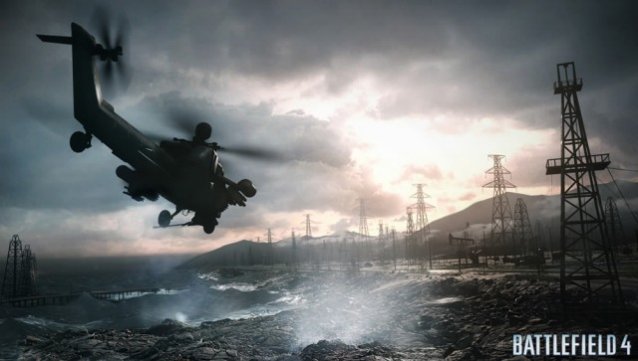
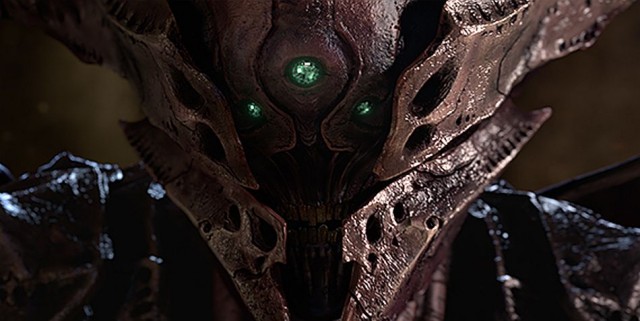 Destiny: The Taken King: Here's List Of All 105 Quests
Destiny: The Taken King: Here's List Of All 105 Quests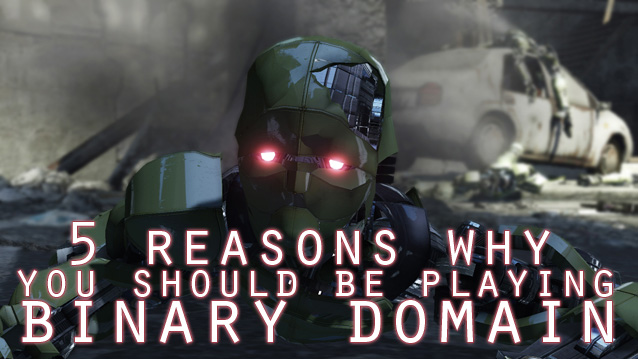 5 Reasons Why You Should be Playing Binary Domain
5 Reasons Why You Should be Playing Binary Domain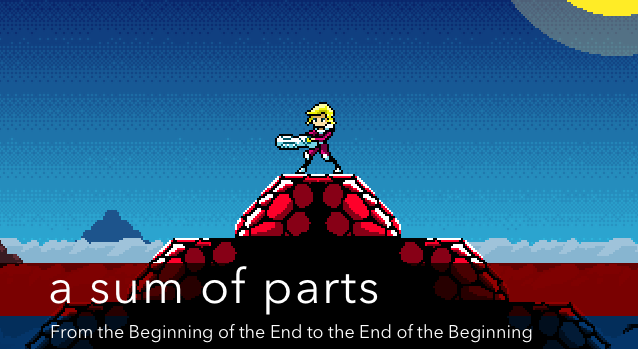 A Sum of Parts: From the Beginning of the End to the End of the Beginning
A Sum of Parts: From the Beginning of the End to the End of the Beginning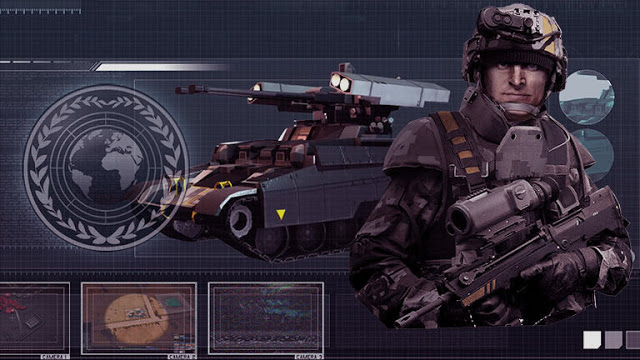 Act of Aggression: Chimera - The Euro Elite Unit in the spotlight
Act of Aggression: Chimera - The Euro Elite Unit in the spotlight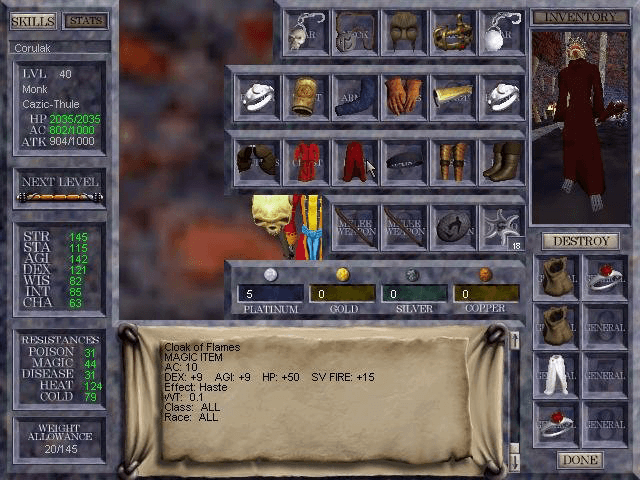 What MMORPGs Taught Me About Self-Improvement
What MMORPGs Taught Me About Self-Improvement